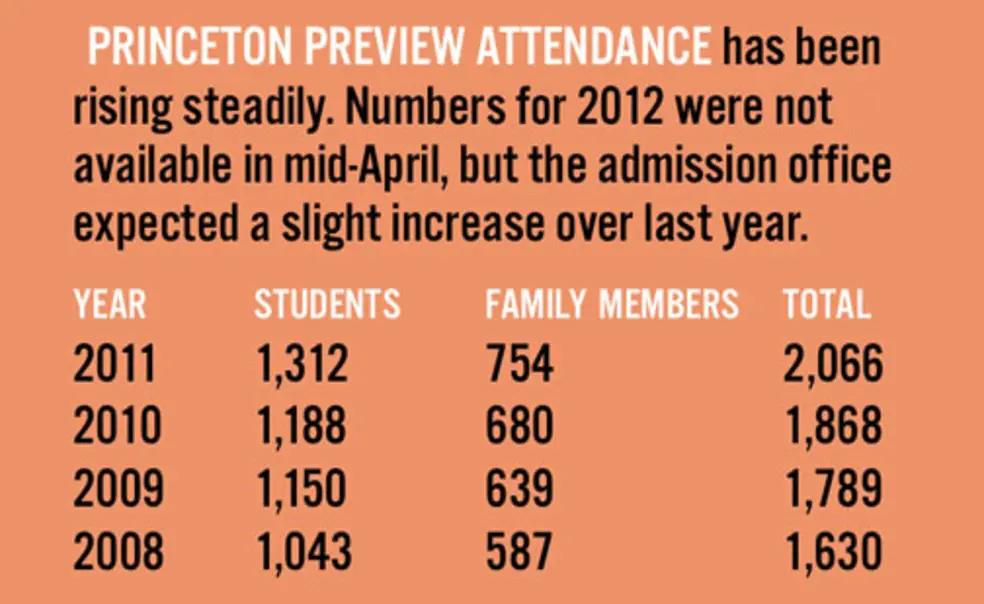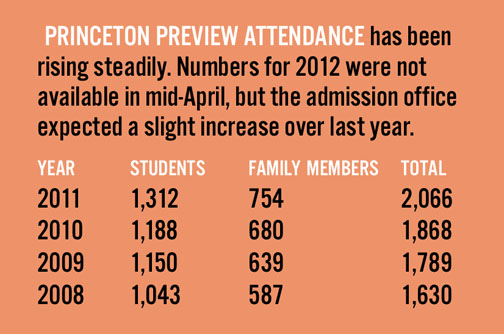Princeton Preview events offer final chance to recruit
When Mark Pullins ’13 attended the two-day Princeton Preview program as a high school senior, he sat in on a math class. When it ended, the professor invited him and a few other admitted students to the department’s afternoon tea, a gathering of faculty and students that has been held daily in Fine Hall since the 1930s. A few minutes later, Pullins was shaking hands with legendary mathematician Andrew Wiles, who famously proved Fermat’s Last Theorem.
For a math lover, meeting Wiles was “the equivalent of seeing a rock star,” Pullins said. “It’s all we could talk about for the rest of the trip.” That interaction — and his conversations with other math faculty members — contributed to Pullins’ decision to choose Princeton. It was just the kind of experience the University hopes this year’s admitted students had during the Princeton Preview programs, held April 19–21 and 26–28.
“We want students to realize that they can have close personal relationships with faculty members, that the academic mentoring that goes on here is very special,” said Dean of Admission Janet Rapelye.
The April courtship period — accepted students had until May 1 to make their decisions — is critical. This year the University offered admission to 2,095 students, or 7.9 percent of the 26,664 applicants for the Class of 2016.
“The recruitment in April is more important than it was 10 or 15 years ago,” Rapelye said. “These students have excellent choices, and we want to make sure they understand all the resources Princeton has for them. When admitted students visit campus, we have found, there is a greater probability they will enroll.”
In April, more than 1,300 students (about 62 percent of those admitted) arrived on campus to meet professors, hear a capella groups, eat college food — and decide whether to enroll at the University. The percentage of students who accepted Princeton’s offer, known as the yield, was 57 percent last spring.
In 2008, Princeton Preview expanded from one to two Thursday-through-Saturday sessions so that students with busy schedules — which may include trips to other schools hosting programs — can fit in a visit. Princeton’s peers have similar events, some for two weekends, some for one, and some over weekdays.
Prospective students want to know, “What is my life going to be like here?” Rapelye said. To answer that question, students were whisked through a packed schedule of panel discussions, eating-club open houses, and meals with their student hosts — they slept in their hosts’ rooms — before departing Saturday morning. A performing-arts event featured opera, dance, and improvisational comedy; the engineering school held an ice-cream social; and campus groups showcased their specialties at the activities fair.
Admitted students received emails or phone calls from the departments and programs in which they expressed an interest, inviting the students to sit in on classes or simply ask questions.
About half the students contacted by the classics department responded with questions, said department chairman Edward Champlin. “We’re also happy to see anyone in person, and usually some drop by or make appointments,” he said. “I just spent a half hour on Monday with a nice guy trying to decide among Princeton, Stanford, and Yale.”
At faculty panel discussions, professors described their courses and took questions. “Usually the students are choosing between fantastic universities, and what they really want to know is, ‘Am I going to be happy here?’” said sociology professor Miguel Centeno. A common concern is Princeton’s grade-deflation policy, he said, with students asking, “Isn’t it really much harder to get an A? Should I be worried about my GPA if I come to Princeton?”
Admitted students come with parents, siblings, and grandparents, Rapelye said. Parents had their own reception with President Tilghman and Rapelye, and about 300 families made appointments or dropped in to talk to financial-aid officers, said Robin Moscato, Princeton’s financial-aid director.
“Many are looking to ask questions about specific parts of the aid process,” she said, and they get “a prompt response to concerns.”
The University offers financial assistance to several hundred students a year to make the trip to campus for Princeton Preview, Moscato said.
Admitted students were invited to an open house at the Lewis Center for the Arts, said Michael Cadden, acting chairman of the center. “Hearing what your peers have to say probably matters most in this process,” he said. “We’re slowly changing the perception out there that Princeton isn’t as ‘artsy’ as some of our sister institutions.”
Changing — or forming — students’ perceptions can be a tricky business. “But we have to leave the decision up to them,” Rapelye said. “We’ve chosen them, and now they need to choose us.”













No responses yet